





2300 Yonge Street, Suite 2900, Toronto, ON M4P 1E4 (877) 687-7321 Fax (888) 889-9522 www.canadiangrocer.com
BRAND
GROUP PUBLISHER/SVP, GROCERY & CONVENIENCE, CANADA Sandra Parente (416) 271-4706 - sparente@ensembleiq.com
PUBLISHER Vanessa Peters vpeters@ensembleiq.com
EDITORIAL
EDITOR-IN-CHIEF Shellee Fitzgerald sfitzgerald@ensembleiq.com
MANAGING EDITOR Kristin Laird klaird@ensembleiq.com
DIGITAL EDITOR Kaitlin Secord ksecord@ensembleiq.com
ADVERTISING SALES & BUSINESS
NATIONAL ACCOUNT MANAGER Karishma Rajani (on leave) (437) 225-1385 - krajani@ensembleiq.com
NATIONAL ACCOUNT MANAGER Julia Sokolova (647) 407-8236 - jsokolova@ensembleiq.com
NATIONAL ACCOUNT MANAGER Roberta Thomson (416) 843-5534 - rthomson@ensembleiq.com
ACCOUNT MANAGER Juan Chacon jchacon@ensembleiq.com
DESIGN/PRODUCTION/MARKETING
CREATIVE DIRECTOR Nancy Peterman npeterman@ensembleiq.com
ART DIRECTOR Jackie Shipley jshipley@ensembleiq.com
SENIOR PRODUCTION DIRECTOR Michael Kimpton mkimpton@ensembleiq.com
MARKETING MANAGER Jakob Wodnicki jwodnicki@ensembleiq.com
EDITORIAL ADVISORY BOARD
RAY HEPWORTH METRO
BRENDA KIRK , PATTISON FOOD GROUP
CHRISTY MCMULLEN , SUMMERHILL MARKET
GIANCARLO TRIMARCHI , VINCE’S MARKET
SUBSCRIPTION SERVICES
Subscriptions: $102.00 per year, 2 year $163.20, Outside Canada $163.20 per year, 2 year $259.20 Single Copy $14.40, Groups $73.20, Outside Canada Single Copy $19.20.
Digital Subscriptions: $60.00 per year, 2 year $95.00
Category Captain: Single Copy $20.00, Outside Canada Single Copy $30.00
Fresh Report: Single Copy $20.00, Outside Canada Single Copy $30.00
Subscription Questions: contactus@canadiangrocer.com
Phone: 1-877-687-7321 between 9 a.m. to 5 p.m. EST weekdays Fax: 1-888-520-3608 Online: canadiangrocer.com/subscription-centre

CORPORATE OFFICERS
CHIEF EXECUTIVE OFFICER Jennifer Litterick
CHIEF FINANCIAL OFFICER Jane Volland
CHIEF OPERATING OFFICER Derek Estey
CHIEF PEOPLE OFFICER Ann Jadown
2300 Yonge Street, Suite 2900, Toronto, ON M4P 1E4. Printed in









We are curators of unique brands, helping to elevate brands in Canada and build customer demand through our appetite for fresh insights and data. Join our tasteful collection, and showcase your products nationwide. Visit treeoflife.ca to learn more.







Beverage is a cornerstone category, continually evolving with the flow of culinary trends. Not surprisingly, water and coffee are the beverage of choice for almost all Canadians with near universal penetration.1 Despite consumers closely managing grocery budgets, they continue to make allowances for natural, healthier beverage options. The #1 beverage claim by Canadians is lower/no sugar, followed closely by “made with real ingredients”.1 Sharing stories about how ingredients are sourced and the people behind them provides an avenue to showcase such attributes and highlight brand authenticity as well as transparency. This consumer demand has produced innovation focused on hydration, a back-to-basics approach of replenished electrolytes as part of overall healthy living. Building on this functional trend, consumers are seeking clean, quality and “real” ingredients that provide additional nutritional benefits. In response to the GLP-1 phenomenon the inclusion of added protein, macro nutrients and functional botanicals will fuel ongoing innovation.
Source: 1. Mintel Canada, August 2024
CANADA: BEVERAGES TYPICALLY CONSUMED, 2024
CANADA: CLAIMS THAT MATTER WHEN CHOOSING NON-ALCOHOLIC BEVERAGES TO DRINK, 2024
Low/no sugar
Made with “real” ingredients
Low calories
Boosts energy
Added vitamins
Supports digestive health
Strengthens immunity
Promotes relaxation
Added calcium
Promotes focus
Piant-based
CANADA: DRINKING BEVERAGES MORE OFTEN, THE SAME OR LESS OFTEN VERSUS LAST YEAR, 2024
Our passion for exceptional Cheese & Deli is at the heart of everything we do. With a discerning eye for quality and a deep love for the craft, we curate the world’s finest offerings to inspire elevated food experiences. As dedicated category specialists, we don’t just follow trends - we help shape them.
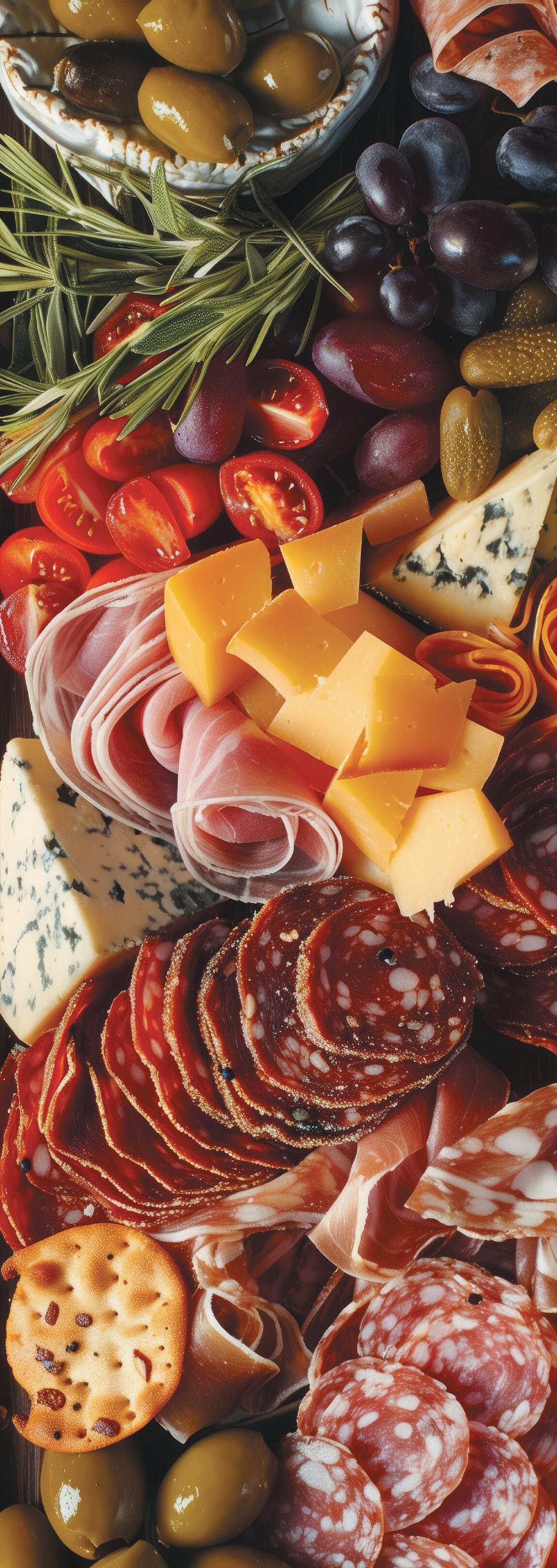






Underscoring its central role in Canadian diets, not only is Cheese consumed by 94% of households but the category continues to show strong growth year over year.1 In total, the category represents $3.7bn, with Exact Weight cheese representing a 94% share.2 Exact Weight, also known as Prepack, is growing +4% in dollars and +2% in volume.2 At least 2/3 of consumers have eaten at least three types of different cheese in the last three months, confirming that at-home deli drawers hold multiple varieties – and consumers are willing to add additional staples to their rotation.1
Specialty Cheese is the largest segment, representing 1/3 of the category. Specialty Cheese is continuing to show robust growth of +9% in dollars and volume – an indicator that, despite consumers watching grocery prices, there is still significant demand for this segment.2 The top specialty cheese types are Feta, Cheddar and Paneer – a clear reflection of Canada’s evolving demographic.
Sources: 1. Mintel Canada, May 2025
2. Nielsen, Exact Weight + Random Weight, NATIONAL EX NFLD GB +DR +MM L52W period ending July 26, 2025
CANADA: TYPES OF CHEESE EATEN IN THE PAST THREE MONTHS, 2025
Cheddar
Mozarrella
Parmesan
Swiss Feta
Gouda
Brie/Camembert
Provolone
Blue cheese
Goat
Paneer
None of these
Source: Mintel, May 2025
% of consumers
EXACT WEIGHT - TOP 8 SPECIALTY SEGMENTS IN THE PAST THREE MONTHS, 2025
% of consumers
CANADA: REPERTOIRE ANALYSIS OF TYPES OF CHEESE EATEN IN THE PAST THREE MONTHS, 2025

1-2 types of cheese
2025
3-4 types of cheese 5 or more types of cheese




Source: Nielsen, Exact Weight, NATIONAL EX





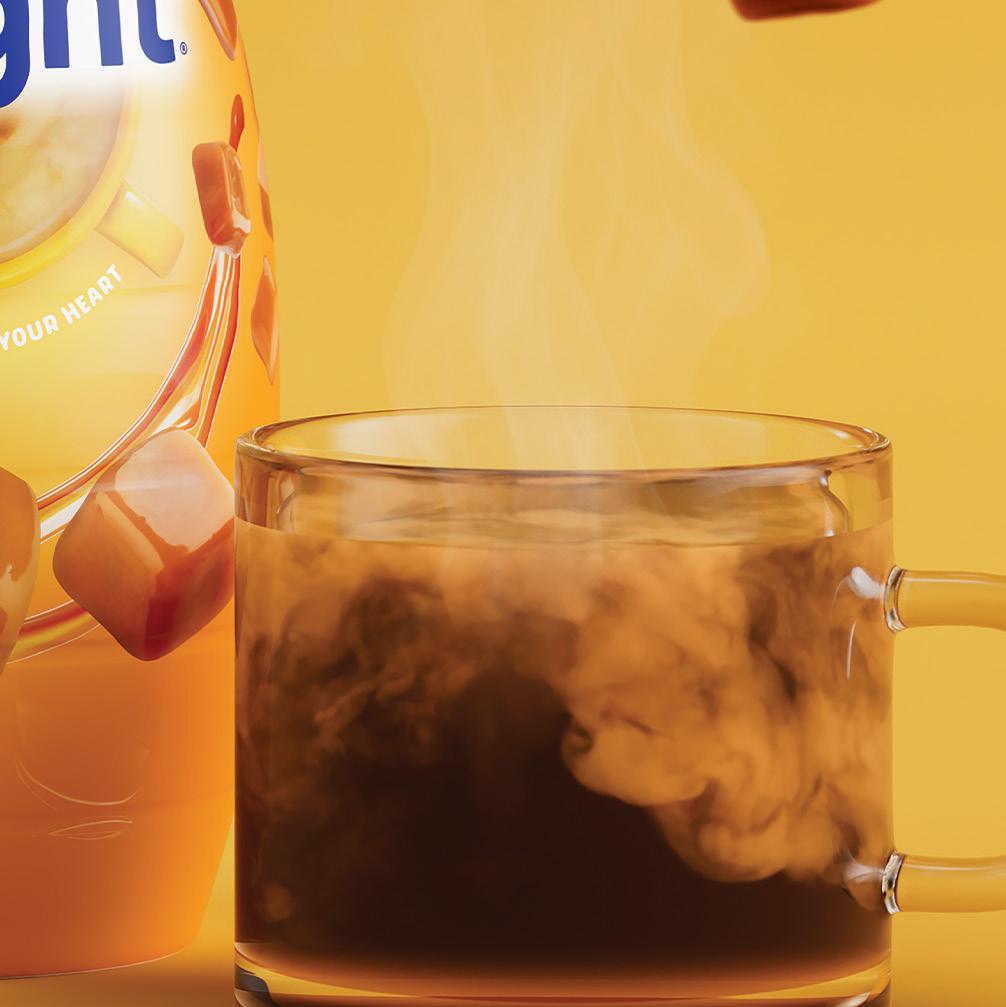









Overall, the growth of Flavoured Coffee Creamers in Canada is propelled by consumer demand for variety, innovation, plant-based and functional options, and the ability to customize the coffee experience, all amplified by urban lifestyles and social media trends.1

Flavoured Coffee Creamers category growth of +8.4% $ sales ranks among the highest growth categories within Refrigerated Dairy, as the total Refrigerated Dairy department posts +4.9% $ growth in the Latest 52 weeks.2 Canadians are highly receptive to new coffee experiences, with a strong interest in flavoured creamers and unique flavour profiles. This openness is particularly pronounced among younger generations, who are more likely to experiment with new products and seek out creative coffee options, including flavoured and plant-based creamers.3
Refrigerated Coffee Creamers which hold a 90.4 $ shr of total creamers, are posting strong growth of +5.7% $ sales, with both Traditional +5.9% $ and Plant Based +5.1% $ sales. Non-refrigerated Coffee Creamers (9.1 $ share) are also finding success in the latest 52 weeks with +27.3% $ growth led by Barista Shelf Stable Creamers, posting gains of +25.2% in the last 52 weeks on increased Total Distrinbution Points (TDP’s) of +25.5% and increasing $ Sales per Point of Distribution (SPPDP) of + 21.9%.2
There is a notable demand for plant-based creamers, especially in provinces like Ontario and British Columbia, where consumers are more likely to prefer dairy alternatives. This trend is influenced by demographic factors, such as a higher population of individuals of Chinese background, who show a strong preference for plant-based options. Newer Canadians, in general, are more interested in plant-based and protein-enriched creamers compared to established Canadians.3
Sources: 1 Mintel, Identifying New Opportunities for Coffee Creamers – 2025
2 Nielsen MarketTrack, National Inc NFLD GB +DR +MM, L52W period ending August 9th, 2025
3 Mintel, Coffee & Coffee Shops – Canada – 2025
L52W ENDING 6/9/25
L52W ENDING 6/09/24 # OF BUYERS # OF OCCASIONS VALUE PER OCCASION






Source: NielsenIQ Panel On Demand Homescan I CA - DANONRE - COFFEE CREAMERS | 11 Facts of COFFEE CREAMERSFLAVOURED for Total Outlets in Total Canada during L52W period ending June 9, 2025





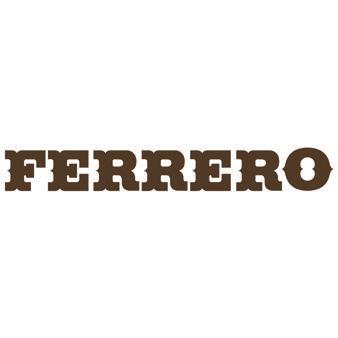




The Canadian Chocolate market is well-established and a steadily growing industry, that saw +2% growth in $ sales in 20241. With Chocolate so synonymous during the holidays, key seasonal peaks, such as Valentine’s Day, Easter, Halloween, and Christmas contribute significantly to overall sales of the Chocolate market2. During these times, the Chocolate industry is often greeted with seasonally-specific graphics, limited-time formats, or limited-time offerings during key holidays. Nearly two-thirds of Canadian households purchase Chocolate during the Christmas holiday3, making Christmas the largest $ sales driver of category sales during the year. Chocolate remains a popular Christmas gift, with 1 in 2 people choosing to give it during the holiday season4. Boxed Chocolate represents 62% of total seasonal category $ sales5, making it the most loved form of Chocolate during the holidays. In particular, Boxed Chocolate is a favourite for gift-giving, for hosting or for sharing during a party, or even as a self-indulgent treat during the festive season6 .
As a retailer, stocking up on leading-brand Boxed Chocolates will provide your shoppers with options for all their holiday special moments.
Sources: 1. NielsenIQ Discover, Total Chocolate, National GDM+ RFC + C&G + GMWC, L52W period ending December 28 2024
2. NielsenIQ Discover (XMAS INCL (EVDAY SEAS EXCL JR), National GDM + RFC+ C&G, 9 week period ending December 28 2024; EASTER SEAS CHOC, 12 week period ending April 6 2024, NATIONAL EX NFLD GB + DR + MM + RFC + C&G; VAL INCL (EVDAY SEAS), 5 week period ending February 24 2024, NATIONAL EX NFLD GB+ DR + MM + RFC + C&G; HLWN SEAS + EVDAY SEAS JR, 13 week period ending November 9 2024, NATIONAL EX NFLD GB+DR+MM + RFC + C&G)
3. Numerator Insights, Christmas Chocolate, Total Outlets, 9 week period ending December 28 2024
4. Suzy 2023– Christmas Survey n=300, Shoppers 18-65 who bought Chocolate at the Holidays
5. NielsenIQ Discover, XMAS INCL (EVDAY SEAS EXCL JR) BOXED Chocolate, National GDM + RFC + C&G, 9 week period ending December 28 2024
6. Suzy – Christmas Survey n=300, Shoppers 18-65 who bought Chocolate at the Holidays
CHRISTMAS IS THE BIGGEST SEASON OF THE YEAR FOR CHOCOLATE
BOXED IS THE BIGGEST FORMAT AT CHRISTMAS WITH SHOPPERS BUYING FOR GIFTING, HOSTING AND TREAT OCCASIONS
Total Christmas $ Sales: $302.5M




Source: NielsenIQ Discover XMAS INCL (EVDAY SEAS EXCL JR), 9 week period ending December 28, 2024. NATIONAL EX NFLD GB + DR + MM + RFC + C&G EASTER SEAS CHOC, 12 week period ending April 6 2024, NATIONAL EX NFLD GB + DR + MM + RFC + C&G VAL INCL (EVDAY SEAS), 5 week period ending February 24 2024, NATIONAL EX NFLD GB + DR + MM + RFC + C&G HLWN SEAS + EVDAY SEAS JR, 13 week period ending November 9 2024, NATIONAL EX NFLD GB + DR + MM + RFC + C&G
CHOCOLATE CONTINUES TO BE A KEY GIFT AT CHRISTMAS
Christmas 2024 Halloween 2024 Valentine’s Day 2024 Easter 2024 gift Chocolate every year gift because everyone likes it people gift it on its own
Source: Suzy 2023 – Christmas Survey n=300, Shoppers 18-65 who bought Chocolate at the Holidays
Q14 - Do you always give chocolate as a gift at the holidays?
Q15 - Why did you decide to purchase Chocolate as a gift this year?
Q13 - When gifting chocolate this Holiday Season, did you gift the chocolate with another item or just gift on its own?
Source: Nielsen Market Track. XMAS INCL (EVDAY SEAS EXCL JR). 9 week period ending December 28 2024. NATIONAL EX NFLD GB + DR + MM + RFC + C&G
TOP REASONS WHY SHOPPERS BUY BOXED CHOCOLATE AT THE HOLIDAYS
Source: Suzy – Christmas Survey n=300, Shoppers 18-65 who bought Chocolate at the Holidays
Q4 – And now, for each of the reasons you just mentioned, please select the chocolate format/s you purchased for each of those occasions
In 2024, we installed solar panels on our grading stations and farms in Southern Ontario.


Taking local action for the greater good.™
Winner, Canadian Grocer Impact Award Sustainability Category (2024) *At the Gray Ridge
We harness enough power to sustain approximately 65 average households every day, reducing our energy consumption up to 26%* © Gray Ridge Eggs, Inc., 2025






The Canadian egg market including shelled, hard-boiled, liquid, and liquid replacement products represents a $1.6 billion category in Canada.¹ Although shelled egg growth is the largest driver of egg performance, all forms of eggs such as hard-boiled and liquid eggs both grew +8% in dollars vs YA. (Figure 1)
Shelled eggs has a wide consumer appeal as evidenced by over 92% of Canadian households purchasing a shelled egg product. 2 Despite being a mature sector, which typically experiences limited expansion, the category has shown significant growth of +$139MM or +9.5% vs last year. This trend is driven by shoppers increasing their amount spent on eggs by an average of 6.6% on each shopping trip. (Figure 2)
It’s not just revenue that’s growing in the category. Canadian consumption of eggs has increased as tonnage (dozens) is up by 4%. Consumers are clearly moving to larger sizes as both 24 packs and 30 packs have grown tonnage by 37% and 33% respectively. Contrast that by declines in 6’s and 12’s at -15% and -5%. (Figure 3)
Another consistent trend in the category is the growth of specialty eggs. Conventional eggs have grown tonnage by +3% where specialty eggs grew +6% driven by all segments. (Free run +20%, Free range +9%, Omega +8%, Organic 12%) ¹
Unlike most categories, local / provincial brands are important and represent a sizable share of category dollars. Local / Regional egg brands represent a 29.9 dollar share of the shelled eggs category and are growing +9.9% vs nationally branded eggs which represent 12.1 share of dollars and growing at 2.6%. (Figure 4)

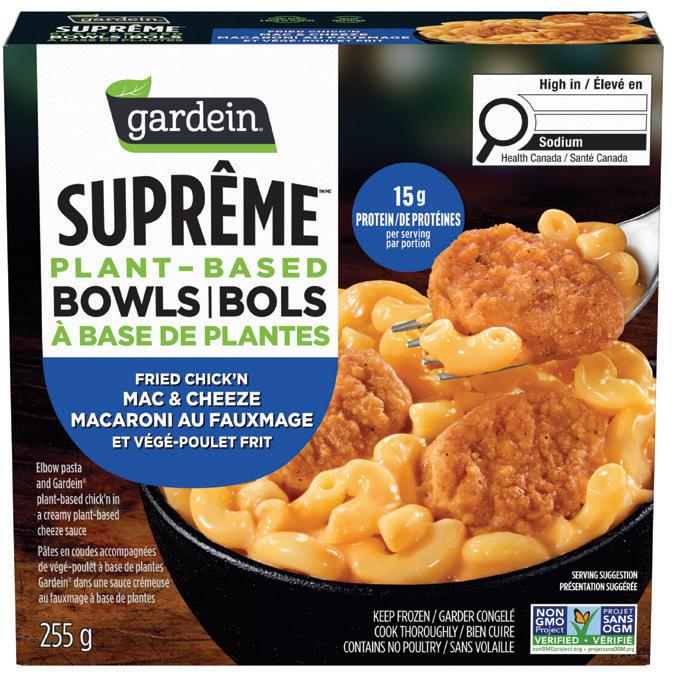












Despite ongoing economic pressures and changing routines, Canada’s frozen food category continues to show remarkable resilience. In the latest 52 weeks, total tracked frozen food sales surpassed $8.8 billion, with per capita consumption climbing to 32 units per person per year.1
Frozen dinners and entrées, the category’s largest segment, has surged with a 7.7% dollar CAGR, now reaching $2.7 billion in sales. In the latest 52 weeks sales rose +2.3% reflecting strong consumer demand for convenient, high-quality meals.1
A major driver is the shift in where meals are sourced. Retail accounts for over 84% of eating occasions, similar levels seen during the pandemic in 2020.2 While a 1% increase from 2023 may seem minor, it reflects a meaningful return to at-home dining. Frozen foods are well-positioned to meet this shift, offering value, convenience, and versatility—consistently cited as top purchase drivers.3
With overall frozen food sales and units rising, families with kids (43% of frozen occasions), multicultural households (27%), and younger generations (49%) remain key contributors to category strength, together accounting for a major share of frozen food occasions.3
Innovation is also driving excitement, with globally inspired meals and better-for-you options expanding the aisles. In fact, 24% of food occasions are motivated by a desire for healthy or nutritious choices.2 Both Gen Z and Millennials tend to opt for more multiculturally-inspired dishes, underlining the appetite for exploratory taste preferences and cuisines.2
As Canadians continue to balance busy schedules and evolving tastes, frozen foods are set to remain a trusted staple in households from coast to coast
Easy to prepare/little or no planning
Satisfies my hunger
Wanted something tasty
Comforting
Good value for the money
Satisfies a craving
Could be eaten quickly
Wanted something all the household members ...
Good to share with friends/family
Could be made with items on-hand
Source: Mintel, May 2025
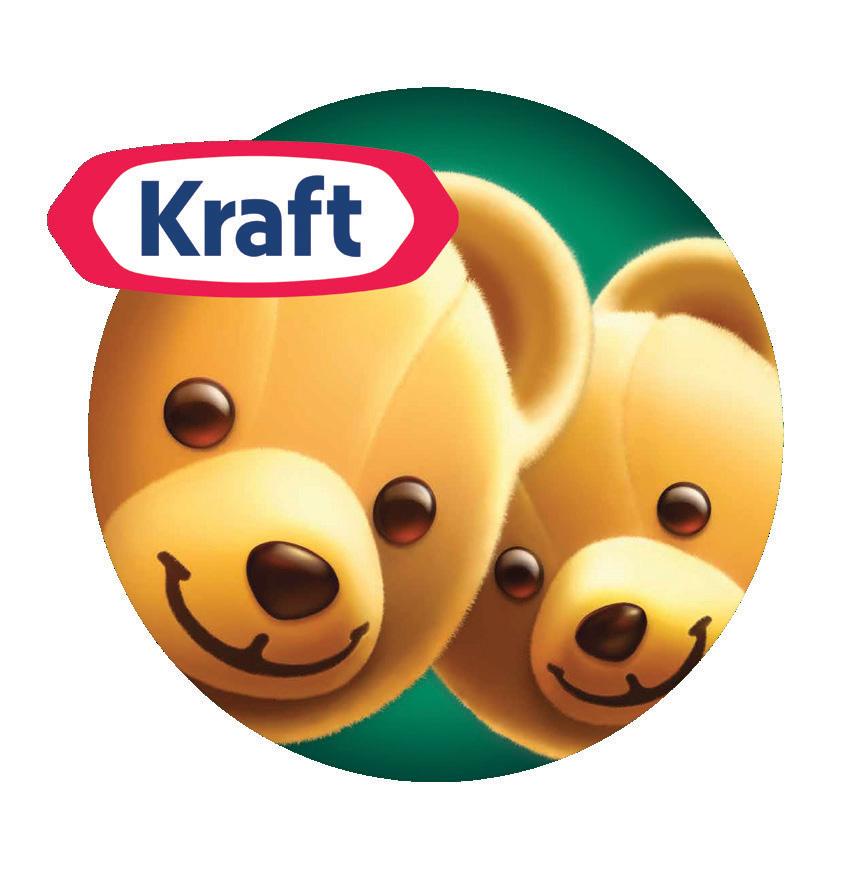


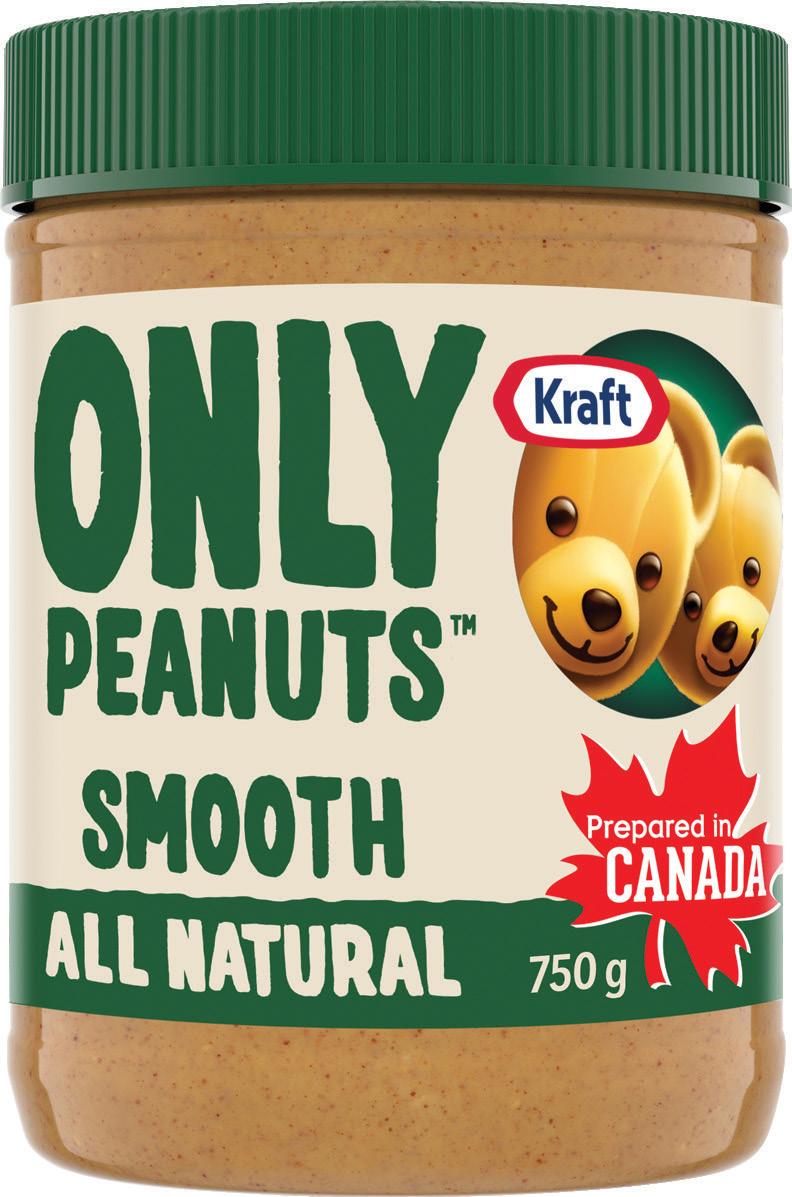








The Canadian peanut butter category is valued at $347.6 million,1 holding steady in dollar sales with a modest -0.3% decline in pounds sold in 2025. Conventional peanut butter (excluding Natural) continues to anchor the segment with 78.3% share,1 though it faces gradual year-overyear dollar volume declines. Natural peanut butter remains a category growth driver, posting +3.3% in dollar sales and increasing share to 21.7%.1
Peanut butter’s role as a staple in Canadian diets is underscored by strong penetration at 66.5% of households,2 with equally robust repeat rates, with 71.4% of buyers returning, highlighting habitual consumption and loyalty across the category.2 According to NIQ’s Category Shopping Fundamentals survey, consumers are increasingly guided by health-oriented attributes, particularly: natural ingredient profiles, reduced or no sugar content, and the absence of artificial additives. These preferences are likely contributing to the sustained momentum in the Natural segment, signaling a gradual shift in consumer expectations toward cleaner labels and perceived better-for-you options.
Sources: 1. NielsenIQ, NAT GB+DR+MM, L52W period ending May 18, 2025 2. NielsenIQ Retail


Your cereal’s zero sugar sidekick.



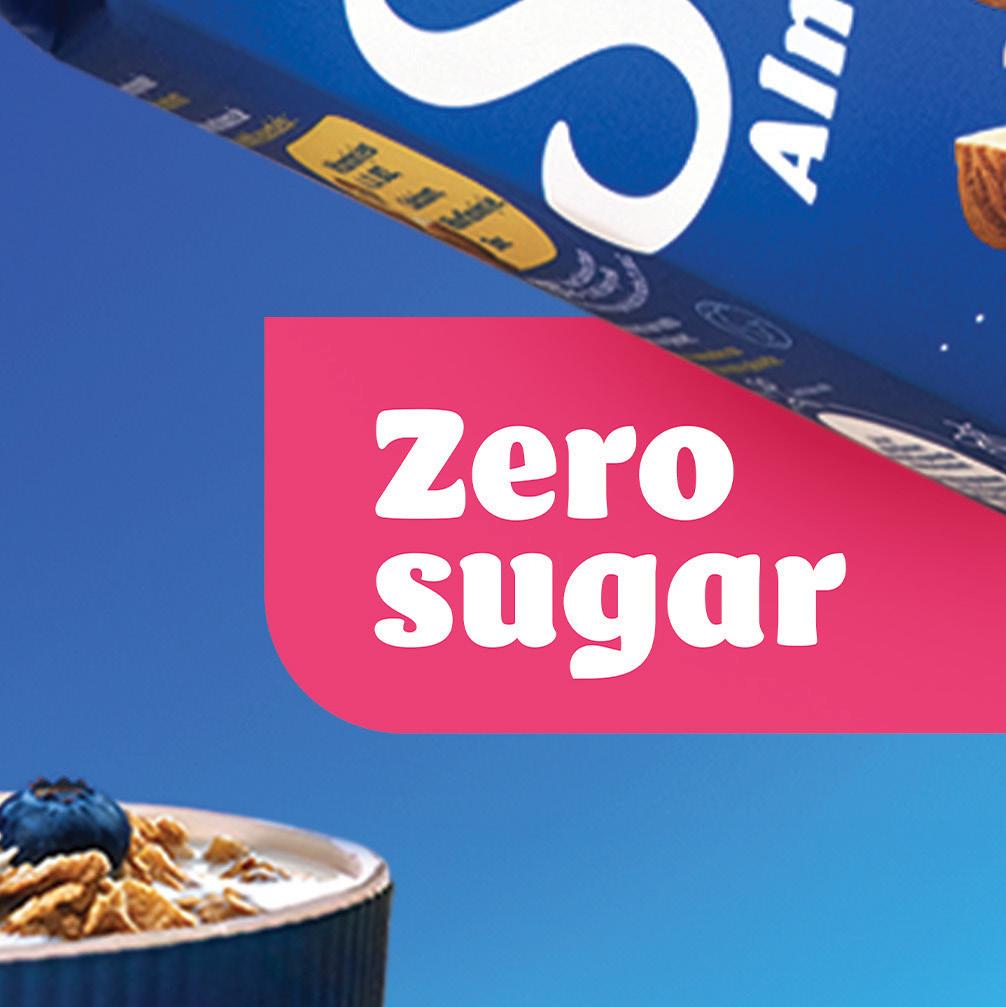










Nutritional quality of plant-based beverages is increasingly important, with consumers seeking products that offer added vitamins, minerals, and protein. Shoppers are motivated by the quality and presence of added nutrients and clean ingredient labels, and there is a growing expectation that plant-based drinks should match or exceed the nutritional benefits of dairy milk.1
Products that highlight high or added protein are especially appealing, as seen with launches that mix plant-based ingredients to boost protein levels and the continued leadership of soy as a plant-based protein.1 Soy, a high-protein plant-based food, considered a complete protein containing all nine essential amino acids, is leading the category with +1.9% $ sales growth in the latest 52 weeks. Plant-based offers reduced sugar and calories compared to dairy-milk, with reduced sugar being a commonly sought after attribute in new product launches.3
Price continues to be a driving consideration—both as a motivator for purchase when it decreases and as a barrier when non-dairy options are perceived as too expensive.2
Sources: 1 Mintel, Dairy & Non-Dairy Milk - Canada – 2023
2 Mintel, Dairy & Non-Dairy Milk - Canada – 2023
3 Mintel, Milk and Non-Dairy Milk US Databook – 2023





$6,128,057 Dairy-Like $3,261,056

























other $1,972,862 Rice $149,361,432









The Mayonnaise and Sandwich Spreads category represents a $423.5MM market, currently growing, with dollar sales up 4.5%, and sales pounds up 2.1%.1
Mayonnaise remains the dominant segment with 83.0% of category share and has gained share each of the past two years. Much of the Mayonnaise category’s growth has been driven by the increasing importance of flavoured items (+74.7% sales pounds vs. 2023).1
Penetration of Mayonnaise is 69.1% and has seen consistent year-over-year growth in household reach.2 While inflation has contributed to Mayonnaise’s growth, the category’s slight increase in pounds per buyer indicates potentially stronger consumer engagement. Additionally, the repeat purchase rate has risen to 73.4%, reflecting improved loyalty and sustained demand.2
Sources: 1. NielsenIQ Retail Measurement | CA - KRAFT HEINZ - VISCOUS - 5 Facts of 7 Products in NATIONAL EX NFLD GDM + GM+WC during 3 52 Weeks Rolling, 2 Years, YTD period ending July 26, 2025; 2. 13 Facts of VISCOUS, MAYO (MAYONNAISE), SSD (SPOONABLE SALAD
34 weeks ending August 23, 2025 Demographic













$ AND $ CHANGES VS. YA $ SHARE PER

(in $ millions) (in millions of sales pounds)





Source: NielsenIQ Retail Measurement | CA - KRAFT HEINZ - VISCOUS - 5 Facts of 7 Products in NATIONAL EX NFLD GDM + GM+WC during 3 52 Weeks Rolling, 2 Years, YTD period ending July 26, 2025.








Yogurt has seen another breakout year in Canada fueled by increasing household penetration, hitting 88.9% in the latest 52 weeks +0.4 pts1 and growing consumer demand. The category has experienced a noticeable shift to premium segments providing value-added and functional benefits. The category is among the fastest growing within Refrigerated Dairy in the latest 52 weeks at +11.5% $’s and +6.0% EQ (equivalized tonnage).1
The primary motivation for increasing yogurt consumption among Canadians is the pursuit of a healthier diet. Consumers are seeking yogurts with specific health benefits, such as high protein, digestive health, and immune-boosting properties. Functional benefits and natural ingredients, including real fruit and locally sourced dairy, are especially appealing to health-conscious Canadians.2
Half of Canadian yogurt consumers are willing to pay more for yogurt that offers added health or functional benefits, such as high protein content.2 Younger consumers are driving this willingness to pay for extra benefits including functional health. Nearly half (45%) of Canadian yogurt consumers consider “high in protein” an important health-related factor when choosing yogurt or yogurt drinks. This demand is part of a broader trend where protein is prioritized for its role in supporting muscle health, satiety, weight management, and overall balanced diets.2 The two largest segments within the Yogurt category benefit from these trends with High Protein Yogurt hitting a 39.9 $ share, on +27.4% $ growth and Gut Health holding the #2 spot at 19.2 $ share with +1.8% $ growth.1





